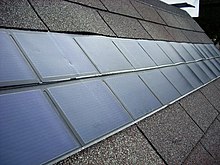Solar panels are devices that convert sunlight into electricity. They are made up of solar cells, which are typically made of silicon or other materials that can absorb photons of light and convert them into electrons. When sunlight hits the solar panel, the solar cells generate a direct current (DC) electrical charge. This charge is then converted into an alternating current (AC) by an inverter so that it can be used to power homes, businesses, or other electrical devices.
Solar panels are typically installed on rooftops or other structures that have access to direct sunlight for most of the day. They can be connected to a battery storage system so that excess energy generated during the day can be stored and used at night or during periods of low sunlight. Solar panels can be used to supplement or replace traditional grid-powered electricity, which can help reduce greenhouse gas emissions and lower energy costs over time.
Solar panels have become increasingly popular in recent years as the cost of manufacturing and installing them has decreased. They are a renewable and sustainable source of energy that can help reduce reliance on fossil fuels and mitigate climate change.
What are the advantages of solar panels?
There are many advantages to using solar panels to generate electricity, including:
Renewable and Sustainable: Solar energy is a renewable and sustainable source of energy, meaning it can be harnessed without depleting natural resources or contributing to climate change.
Cost-Effective: Although solar panels can be expensive to install, the cost of manufacturing and installing them has decreased in recent years. Once installed, solar panels can help reduce energy bills and save money over time.
Low Maintenance: Solar panels require little maintenance beyond periodic cleaning and inspections. They can last for 25 years or more with proper care.
Energy Independence: Solar panels allow homeowners and businesses to generate their own electricity, reducing reliance on grid-powered electricity and increasing energy independence.
Environmental Benefits: Solar energy does not produce greenhouse gas emissions or other pollutants, making it a cleaner and more sustainable source of energy compared to fossil fuels.
Increased Home Value: Installing solar panels can increase the value of a home and make it more attractive to potential buyers.
Government Incentives: Many governments offer incentives such as tax credits, rebates, and grants to encourage the adoption of solar energy, making it a more affordable option for homeowners and businesses.
Overall, solar panels offer many benefits to homeowners and businesses, including reduced energy costs, environmental benefits, and increased energy independence.
What are the disadvantages of solar panels?
While there are many advantages to using solar panels, there are also some potential disadvantages to consider:
Upfront Cost: Solar panels can be expensive to purchase and install, which can be a significant barrier for homeowners or businesses with limited budgets.
Weather Dependence: Solar panels rely on direct sunlight to generate electricity, which means their output can be affected by weather conditions such as clouds or fog.
Space Requirements: Solar panels require a significant amount of space to generate enough electricity to meet the needs of a home or business. This can be a challenge for homeowners with limited roof space or businesses with limited land area.
Energy Storage: Solar panels generate electricity during the day, but energy storage solutions such as batteries are needed to store excess energy for use at night or during periods of low sunlight. These storage solutions can be expensive and may require additional maintenance.
Maintenance: Although solar panels require little maintenance, they still require periodic cleaning and inspections to ensure they are functioning properly.
Location Limitations: Some areas may not receive enough sunlight to make solar panels a viable option, which can limit their effectiveness in certain regions.
Environmental Impact: While solar panels produce fewer emissions than fossil fuels, their manufacturing process can still produce waste and pollution.
Overall, while solar panels offer many benefits, they also have some potential drawbacks that should be considered when deciding whether to invest in them.
How much do solar panels cost in the UK?
The cost of solar panels in the UK can vary depending on a number of factors, including the size of the system, the type of panels used, and the region where they are installed.
In general, the average cost of a residential solar panel system in the UK ranges from £4,000 to £6,000 per kW installed. For a typical 3-4 kW system, the cost could range from £12,000 to £24,000, including installation and associated hardware such as inverters and mounting equipment.
However, it’s important to note that the cost of solar panels has been steadily decreasing in recent years, making them a more affordable option for many homeowners. In addition, many government incentives such as the Smart Export Guarantee (SEG) and the Renewable Heat Incentive (RHI) can help offset the cost of installing solar panels.
It’s also important to consider the long-term cost savings associated with solar panels. While the upfront cost of installation can be high, solar panels can help reduce or eliminate monthly energy bills, saving homeowners money over the lifetime of the system.
Overall, the cost of solar panels in the UK can vary depending on a number of factors, but they can be a cost-effective investment for many homeowners over the long term.

